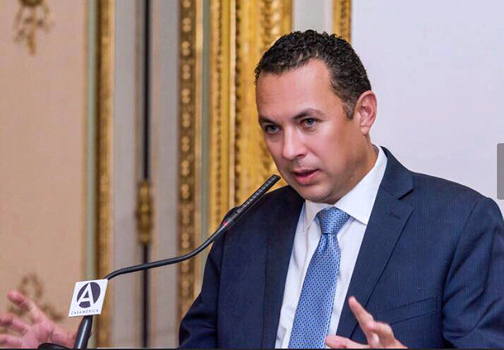Op-Ed: 4 reasons why the Republican Tax Bill is a disaster for Latinos


Author Héctor Sánchez-Barba chairs the NHLA and is executive director of Labor Council for Latin American Advancement.
While we continue to push for the Dream Act before the end of the year and the extension of Temporary Protected Status, we cannot lose sight of a major threat facing the Latino community and the nation.
Both chambers of Congress have passed far-reaching legislation to overhaul our federal tax system.
While the House and Senate each passed different bills, they’re the same in their overall impact: massive tax breaks for large corporations and the wealthy, while eliminating tax deductions used by the middle class, harming Puerto Rico, and setting the stage for cuts to the federal anti-poverty programs that help struggling families make ends meet. Latinos face four devastating impacts should this legislation be signed into law.
First, the tax overhaul worsens income inequality, which matters because the less that wealth is spread out across the population, the larger the number of people struggling to get by.
Among individuals, the top one percent already receives 24 percent of all income in the U.S. and holds 39 percent of all wealth, while the bottom 90 percent earns 50 percent of total income and holds just 24 percent of the nation’s wealth. This is a concentration of wealth not seen in the U.S. since the 1930s.
And yet, Congressional Republicans are preparing to send legislation to the president’s desk that will make the wealthiest one percent and big corporations even richer, while making millions of working families and those struggling with poverty even worse off.
Under the Senate Republicans’ bill, up to 11.7 million Latino families earning less than $75,000 a year would be hit with a tax increase within the next decade — that’s 70 percent of Latinos in the United States.
For its part, the House plan would leave 8.5 million Latino children’s low-income families worse off by making it harder or impossible to claim the Child Tax Credit. Latino-owned businesses wouldn’t fare much better, with an estimated four in five getting a negligible gain of 0.3 percent in after tax revenue while big corporations, hedge funds, and real estate developers would reap billions of dollars in benefits.
Never in our lifetime has there been a single piece of legislation that does more to exacerbate income inequality.
Second, the tax bill includes an attack on the Affordable Care Act and will increase insurance premiums and result in 13 million more people being uninsured.
The Senate bill included repeal of the individual mandate, which requires people to have health insurance or else pay a tax penalty. The House is expected to accept this provision in a final compromise bill.
While no one likes a tax penalty, repealing the mandate provides no incentive for younger and healthier workers, who may not think they need health insurance, to purchase coverage on the health insurance marketplaces created by the Affordable Care Act. This will leave behind an older and likely sicker pool of customers for insurers to cover, driving up insurance premiums for everyone else.
This isn’t sound policy, but just the latest attempt to sabotage the Affordable Care Act, on top of the detrimental actions President Trump already took earlier this year. Together, these steps will significantly erode the gains Latinos have made thanks to the Affordable Care Act, which resulted in 4.2 million Latinos obtaining health insurance coverage, and which brought the Latino uninsured rate to a record low of 16.2 percent.
Third, the tax bill would harm an already devastated Puerto Rico.
Provisions Congress is currently considering would treat Puerto Rico as a foreign country for tax purposes, creating a disincentive for corporations to keep their manufacturing facilities on the island.
These provisions would decimate the manufacturing industry in Puerto Rico, leading to an estimated loss of 170,000 jobs and a quarter of the Puerto Rican government’s revenues. Puerto Rico is still reeling from a fiscal crisis and struggling to return to normal life after Hurricanes María and Irma.
Rather than cripple Puerto Rico’s recovery, Congress should expand access to refundable tax credits such as the Earned Income Tax Credit and Child Tax Credit, helping families provide for their children and stay on the island.
Fourth, the Republican tax overhaul adds $1.4 trillion to the federal budget deficit, putting a squeeze on funding for important domestic priorities that grow the middle class.
Despite spending the past eight years railing against the budget deficit, Republicans are about to blow an even larger hole in the federal budget, and they want the poor and working families to pay the price.
House Speaker Paul Ryan has announced that he plans to put Medicaid, Medicare, and anti-poverty programs on the chopping block in 2018 to close the deficit.
For Latinos, this would be a disaster. Medicaid alone provides health coverage for 18 million Latinos. Cutting nutrition programs jeopardizes access to affordable food for 10 million Latinos. Cuts to housing, nutrition, and income support programs that help families make ends meet will put millions of Latinos at risk of falling into poverty.
A larger deficit will also put pressure on education funding priorities, meaning we’ll likely see cuts to funding for public schools, Head Start (which provides early childhood education to 400,000 Latino children), and Pell Grants (which provides financial aid to 1.8 million Latino college students)
The pain of Republicans’ reckless tax policy will be felt most acutely by our children. Budget cuts to education and health programs, tax policies that make their families worse off, and a ballooning national debt that their generation will have to pay off, will make it more difficult for today’s youth to achieve the American Dream that their parents envisioned for them.
This is why the National Hispanic Leadership Agenda has opposed these tax plans and will work to ensure that those Members of Congress who advance this disastrous policy will be held accountable. The tax debate has made it clear that too many of our elected representatives are putting the interests of wealthy elites ahead of the American people. In a democracy, there’s a price to pay for that.







